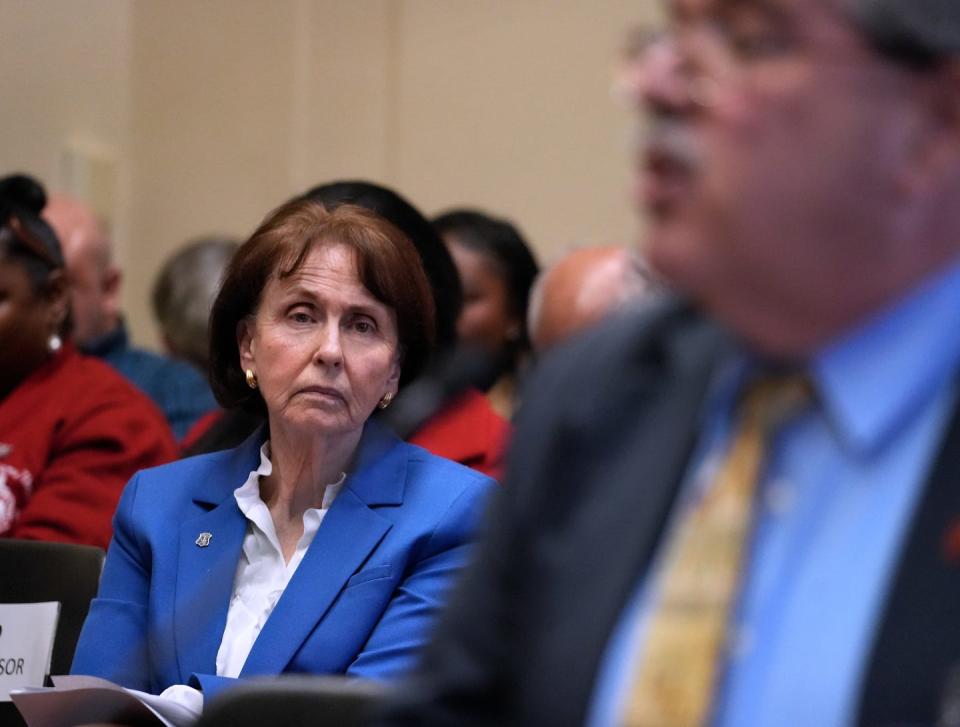Critics sound alarm over 'Don't Say Gay'-style bill in RI legislature. Here's what it says.
On Wednesday night the Rhode Island House Education Committee heard a bill written in the style of Florida's so-called "Don't Say Gay" law. Opponents have sounded the alarm, raising concerns over its implications for Rhode Island schools and students.
The "Parents' Bill of Rights Act," sponsored by Republican Rep. Patricia Morgan, calls it a "fundamental right of parents to direct the upbringing, education and care of their minor children." It's not as specifically worded as Florida's "Parental Rights in Education Act," which explicitly bans teaching about gender identity and sexual orientation to young children, but there are strong parallels.
What does the bill say?
Specifically, the bill states that parents have the right to remove their children from sex education classes — a right parents already have — and can object to curriculums because of "beliefs regarding morality, sex and religion, or the belief that such materials are harmful."
More: As 'Don't Say Gay' and similar bills take hold, LGBTQ youths feel they're 'getting crushed'
The bill also would require parental consent for a child's health care, including prescriptions and medical procedures, but not including abortions and clinical laboratory services. State law currently says anyone at least 16 years old can consent to "routine, emergency medical or surgical care."
Additionally, it says information on a "child's health, well-being and education" should not be withheld from parents.

Morgan is also sponsoring a similar, shorter bill that says the government cannot "infringe on the fundamental rights" outlined above.
Payday loan reform in RI: Now, House lawmakers demand a vote to get it done
Lawmakers see prejudice and 'political interference'
The morning before the measure was to be heard, eight lawmakers on the House Education Committee released a statement saying the bill is among a set of proposals motivated by "political interference orchestrated by divisive out-of-state groups aimed at pushing our society and our schools backward toward prejudice."
"While the groups promoting these ideas may be vocal and are trying to cloak these bills in a veil of ‘individual freedom’ and ‘parental rights,’ we understand that most Rhode Islanders aren’t interested in becoming a state where we deny the basic rights of LGBTQ students, ban books and prohibit educators from teaching about the wrongs that have occurred in history," the lawmakers said.
Another bill could affect teaching of race
Morgan is also spearheading another bill with echoes of the conservative agenda in education, one attempting to govern teaching on race, ethnicity, religion and gender.
"No individual is inherently racist, sexist or oppressive, whether consciously or unconsciously, solely by virtue of his or her race or sex," the bill reads. It adds: "An individual, by virtue of their race or sex, does not bear responsibility for actions committed in the past by other members of the same race or sex."
More: RI lawmakers hear impassioned debate on bill to limit teaching of racism, gender identity
The bill is a watered-down version of one Morgan introduced last year, which attempted to stop teachers from saying words such as "supremacy" and "racial guilt" in classrooms. The proposal came up around the same time similar bills were emerging in numerous other states, attempting to curb teaching about race, sex and American history.
Morgan: Bills 'not controversial' but 'common sense'
In response to lawmakers' statement denouncing her bills, Morgan said she is "not interested in ideological narratives that divide our children and hamper their intellectual growth."
"I agree that our children deserve to go to schools where their learning is not limited by political interference orchestrated by divisive out-of-state groups, and I encourage all members of the General Assembly to take that to heart," she added. "Sadly, it appears that the members who are opposing these bills have not read them."
Bills generate backlash from state, city politicians
Morgan's bills attracted a barrage of critical testimony, including from Representatives Jason Knight and Carol McEntee, who called them "an attack on public educators by a small minority looking to spread a vile agenda that is both racist and anti-LGBTQIA."
Providence City Council members Miguel Sanchez and Shelley Peterson also wrote a joint letter in opposition to the bill that would limit teaching on race and other matters of identity. Both called the bill "deeply concerning" and warned that it would ban "the presentation of historical events and figures in a way that acknowledges oppression and victimization."
This article originally appeared on The Providence Journal: Don't Say Gay-like bill filed in RI State House — what it means
